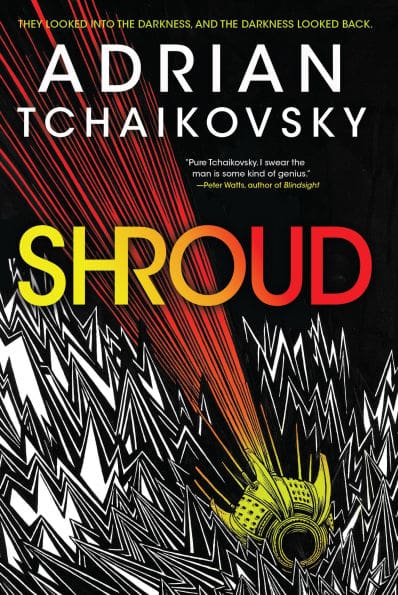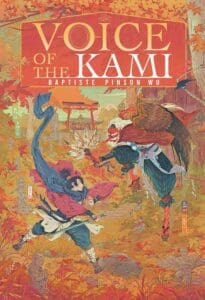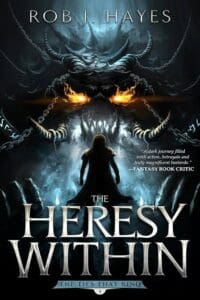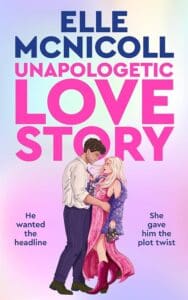
Synopsis:
On a planet shrouded in darkness, a stranded crew must fight for survival. But, the darkness may have plans of its own in this wildly original story from Adrian Tchaikovsky, Hugo and Arthur C. Clarke Award–winning author of Children of Time.
They looked into the darkness and the darkness looked back . . .
New planets are fair game to asset strippers and interplanetary opportunists – and a commercial mission to a distant star system discovers a moon that is pitch black, but alive with radio activity. Its high-gravity, high-pressure, zero-oxygen environment is anathema to human life, but ripe for exploitation. They named it Shroud.
Under no circumstances should a human end up on Shroud’s inhospitable surface. Except a catastrophic accident sees Juna Ceelander and Mai Ste Etienne doing just that. Forced to stage an emergency landing, in a small, barely adequate vehicle, they are unable to contact their ship and are running out of time. What follows is a gruelling journey across land, sea and air. During this time, Juna and Mai begin to understand Shroud’s dominant species. It also begins to understand them . . .
Review:
For about 60 percent of Shroud, I couldn’t get enough. Action and drama on a completely alien moon with our human protagonists hampered by dark and the unknown hidden beneath the blackness. You might think I hated the other 40 percent…but that’s what really clinched how exceptional this novel truly is. With each new thing I read the more I’m convinced that Adrian Tchaikovsky is the new Master of Fantasy and Sci-Fi.
That other 40 percent? That’s what a lot of authors would ditch on the cutting room floor, and perhaps with good reason in their cases. He takes the mundane of politics, economics, and culture — potentially hundreds or thousands of years in the future — and sculpts a bonkers first contact story around it. In the opening of Shroud, we’re introduced to a small team of scientists poised in orbit above a far-off moon. Science is happening, but it’s all under the direction of profit — how can the government exploit the resources of the planet and moon to their advantage? That’s all there, lurking in the background, but the early scenes are all definitely framed around science from a first-person POV, so the crass capitalism isn’t front and center…yet.
When I saw that Tchaikovsky had another First Contact book, a year after putting out Alien Clay, I was a little concerned that it would be a similar story with similar beats. And…yes and no. When I read Alien Clay, I remember thinking that it felt like three different books inside of one volume and Shroud does this as well to a certain degree. But, the internal structure is vastly different and is very much its own unique novel that deserves to be read. In fact, I think Alien Clay and Shroud might work really well as a kind of duology in the differences of first contact between humans and an intelligent alien species.
Don’t get me wrong – this is not just a philosophical novel about what it means to be an alien or how we impose our own humanity upon the otherness of space. This novel rocks with horror-tinged action throughout the core of the book. After the team find what they believe to be life on the moon they’ve called Shroud, an accident on their station strands some of them on the moon that seems to be actively trying to kill them at every turn. It turns into a journey home with no guarantee of success. And the joy is that along the way we discover the life on Shroud is way more intelligent than any of them suspected.
I don’t want to say any of these are similar, but as I read I thought of a few other books and movies. There are tastes of Project Hail Mary as our hapless humans try to communicate with the well-intentioned aliens with mixed results. The Vin Diesel movie Pitch Black definitely came to mind in how they handled the darkness and the dangers that lie within the shadows. I even had thoughts of MacGyver as our pair of protagonists worked their way out of one situation or another.
OK, let’s finish up my thoughts on Shroud and that final 20 percent of the book. So the action-packed narrative of the middle portion wraps up… and again, I think many books end right there. Our characters are heroes for their achievements and we’re left with a happy ending for all. But that’s not what Tchaikovsky does and that’s really what puts Shroud above so many other books I’ve read this year. All the political and economic shadows that were lurking in the background of the first act of the book are back and are challenging the science that seems like it should be more important. The word “exploit” is even used in the final few chapters as a virtue for what they want to do to Shroud. The payoff of the novel is unique and unexpected and Tchaikovsky challenges his readers with their own values and interests.
Ultimately, I couldn’t have been happier reading Shroud. Tchaikovsky is at the top of his game and I look forward to each and every time his name is on the cover.
Thank you to Orbit for providing this book for review consideration via NetGalley. All opinions are my own.










Leave a Reply